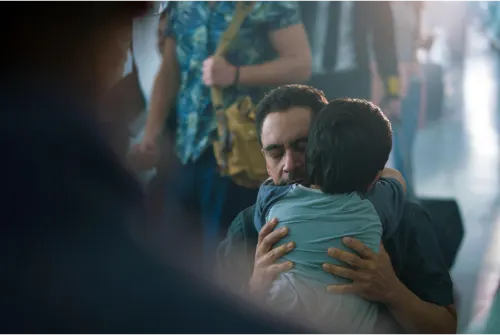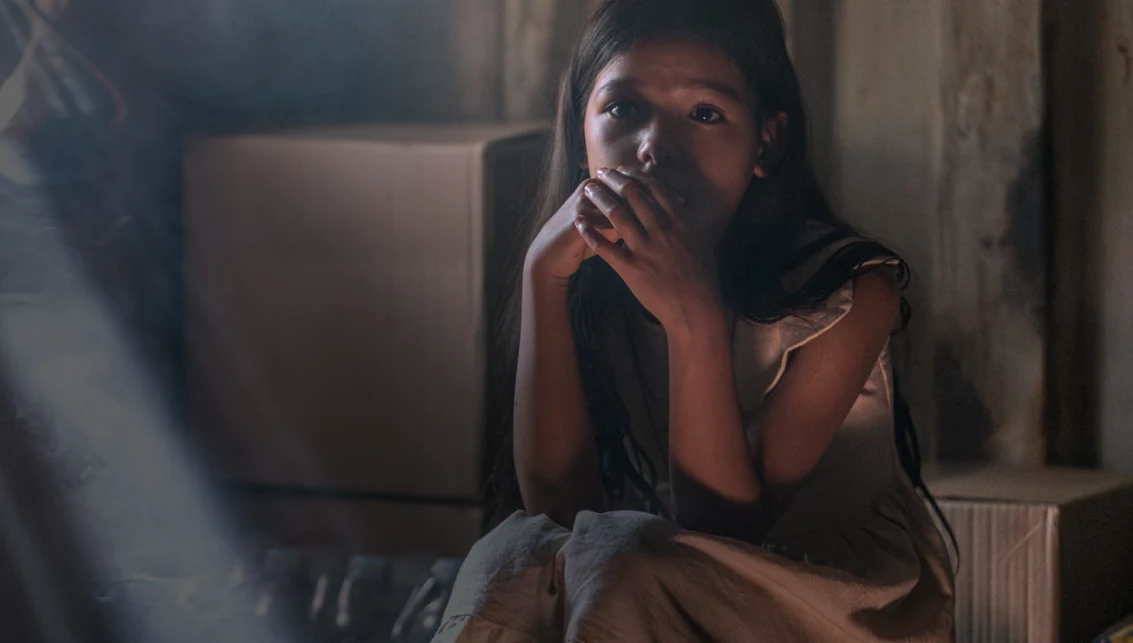While dramatized, “Sound of Freedom” is a powerful movie with the ability to unite us on the global issue of human trafficking. With your newfound awareness gained from the film, knowing accurate information about child exploitation and human trafficking is the next step to effectively fight this unimaginable crime. Thank you for taking the time to learn about this important issue.
Our Rescue was not involved in the production of “Sound of Freedom.” We did not have a consulting role in the movie or have approval rights. And most importantly, we did not have any financial ownership or share in the revenue profits of the film. The movie does represent some elements of Our Rescue’s early operations that laid the foundation for what our organization is today. Join us in the fight to end human trafficking!
Based on a True Story
“Sound of Freedom” was based on a true story but contains dramatized elements. Filmmakers took creative license in portraying the different ways that children can be trafficked, including in shipping containers. While cases exist where children are transported in various vehicles, one study reveals 57% of domestic victims remained broadly within the same areas of their trafficking origin. (GLOTiP, 2022) This means that predators often don’t even have to move their victims in order to traffick them.

Another common misconception is that traffickers target children they don’t know. In reality, traffickers are often acquaintances of the victims. Polaris reported that family members and intimate partners are frequently guilty of trafficking. Of identified sex trafficking cases in the U.S., 44% are trafficked by family and 39% are trafficked by an intimate partner.
Along with family members and intimate partners, traffickers can be soccer coaches and trusted teachers. They can also be family friends, neighbors, or adults in positions of power. This is depicted in the “Sound of Freedom” movie by the character Katy-Gisselle, who used a careful and manipulative grooming process. Her character was based on a real person, however she denied her involvement and is still awaiting trial.
Now that you know more about the movie and facts of human trafficking, strengthen your knowledge on the issue and be courageous to have tough conversations. Discover more about Our Rescue and get answers to your most pressing questions below.

In collaboration with authorities all around the world, Our Rescue has an unwavering commitment to help rescue individuals in need, protect the vulnerable, and ensure predators are brought to justice. We will never give up on the fight to end the evil that is human trafficking.
Our Rescue’s Impact
We lead the fight against child sexual exploitation and human trafficking worldwide.
Our work spans the globe as we assist law enforcement in rescue efforts and help provide survivor care to all those affected. While we prioritize children, we work to empower the liberation of anyone suffering at the hands of those looking to sexually exploit. We offer vital resources to authorities around the world and work tirelessly to raise awareness and meet survivors on their healing journey. Our resolve never falters, and we will boldly persevere until those in need are safe.
Our donors make all of this possible by empowering the professionals at Our Rescue to assist in rescuing the exploited and healing the wounded. These selfless and heroic individuals supporting us truly change lives, making the world a better place in the process.
Is Human Trafficking Happening In The U.S.?
Human trafficking is happening all over the world, and the United States is no exception. According to the National Center for Missing and Exploited Children (NCMEC), human trafficking has been reported in all 50 states.
In 2021, 10,359 situations of human trafficking involving 16,554 individual victims were reported to the National Human Trafficking Hotline, according to Polaris, a non-governmental organization that operates the hotline. As shocking as these numbers are, these reports are most likely only a fraction of the actual problem.
How Are You Fighting Trafficking In The U.S.?
Law Enforcement in the United States is facing an uphill battle to protect our children from sex trafficking and sexual exploitation. Despite their unwavering dedication, many lack essential resources to successfully combat child sexual exploitation and sex trafficking. This is the gap Our Rescue strives to fill. We empower those who courageously serve us with needed support to take meaningful steps against these heinous offenses.
We fight to protect children in our own backyard by developing relationships with law enforcement agencies and offering them resources to expand and amplify their anti-human trafficking and anti-exploitation efforts.
LEARN MORE
How Can I, As A Parent, Protect My Kids?
At Our Rescue, we often hear the question, “How do I keep my children safe?” While there is no one-size-fits-all answer, we have three steps parents and caregivers can take to help safeguard their kids from exploitation.
- First, acknowledge the harsh reality of human trafficking. Only by understanding this complex issue can we combat it effectively.
- Second, educate yourself on the tactics predators use to entice targets. With thorough knowledge and awareness, you can help prevent your kids from falling into traps set by predators.
- Finally, have open conversations with your children about the dangers they may face. These hard talks can save their lives. By taking these critical steps, you can ensure your child stays safe. Don’t let fear hold you back; be proactive in defense of your children.
What Apps Are Safe For My Kids? What Apps Aren’t?
Any app can be safe or unsafe. The key is understanding the features and capabilities of the apps your kids are using. Popular apps and community-focused features make it easy for predators to manipulate and exploit your children. Even apps with “private” settings can still pose a risk. That’s why it is crucial to educate yourself on privacy settings, verification processes, background updates and how to report concerns. Keep your family safe with Our Rescue’s “Start Talking: A Guide to Keeping Children Safe Online.”
Where In The World Do You See The Most Trafficking?
A single term – “human trafficking” – covers various forms, from sex trafficking and forced labor to forced marriage, child soldiering, and even forced begging. Human trafficking is a dark and secretive industry, making it nearly impossible to determine exactly where the highest amount of trafficking is happening. Despite this, we do know it exists in every part of the world and according to the International Labour Organization’s Global Estimates of Modern Slavery from September 2022, the Asia and Pacific region has the highest number of victims of forced labor and marriage. But did you know, sex trafficking is the most common form of trafficking in the U.S.? We must raise awareness and put a stop to it, now more than ever.
How Can I Identify Human Trafficking?
Identifying the signs of human trafficking can help save lives. According to the Department of Homeland Security, there are key indicators you can look for to help recognize trafficking taking place.
How Big Of A Problem Is Human Trafficking?
Human trafficking is not just a problem – it’s a global epidemic. The numbers are on the rise, and it’s not just happening “over there.” An estimated 5.1 million people are in modern slavery on any given day in the United States and child sex trafficking has been reported in every single state.
These statistics are heartbreaking, but we remain hopeful. Government and non-governmental organizations like Our Rescue are fighting tirelessly to defeat this evil. We offer international support in over 30 countries and backing for law enforcement efforts in the United States.
Our Rescue was not involved in the production of “Sound of Freedom.” We did not have a consulting role in the movie or have approval rights. And most importantly, we did not have any financial ownership or share in the revenue profits of the film. However, you can still make a difference in the fight to end human trafficking.
